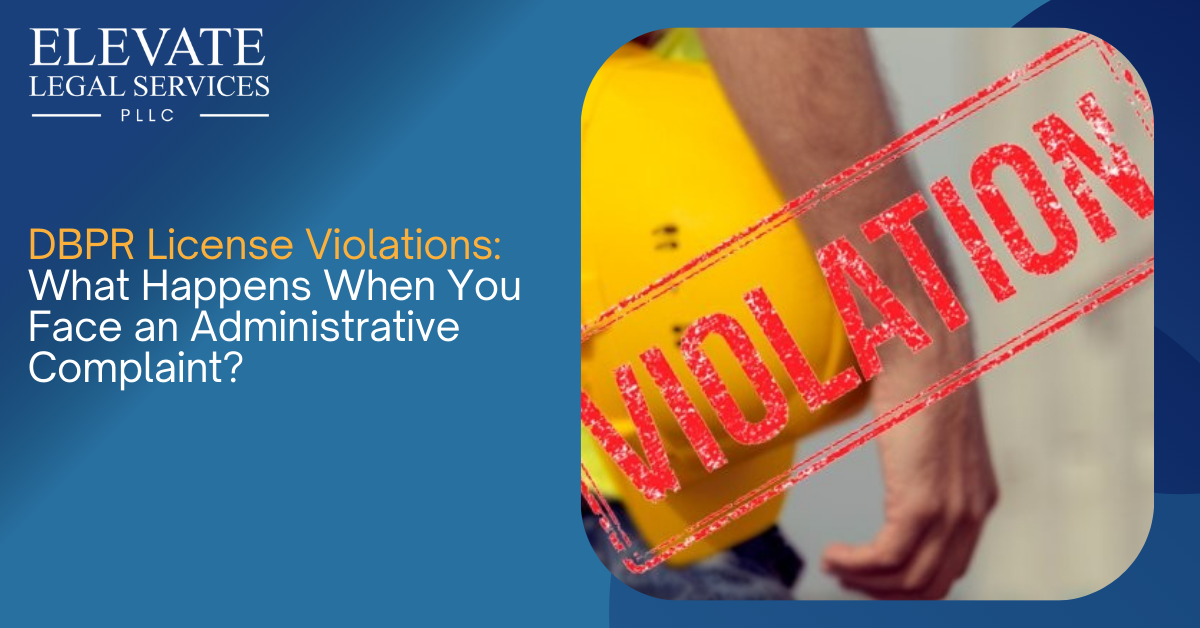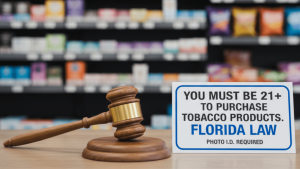
Facing a licensing violation from the Florida Department of Business and Professional Regulation (DBPR) is a serious issue that can threaten your career, reputation, and livelihood. As a licensed professional in Florida, whether you are a contractor, real estate agent, or cosmetologist, it’s essential to stay compliant with DBPR regulations. Violations can lead to penalties, including fines, suspension, or even revocation of your license. If you’re facing an Administrative Complaint, understanding the process and defending your rights is critical.
At Elevate Legal Services, PLLC, we specialize in representing professionals facing DBPR violations and administrative law hearings. If you’ve received an Administrative Complaint, contact us immediately at 561-770-3335 or email [email protected]. Our experienced legal team will help protect your rights and guide you through the administrative hearing process.
What Is the DBPR and What Does It Regulate?
The DBPR is the regulatory agency in Florida responsible for overseeing a wide variety of professions, from construction and real estate to cosmetology and hospitality. The DBPR enforces compliance with state laws, professional standards, and licensing requirements, ensuring that businesses and professionals follow proper regulations. Violations of DBPR regulations can arise from several issues, including:
- Failure to maintain licensure requirements
- Ethical breaches or misconduct
- Non-compliance with industry standards
- Consumer complaints
- Unlicensed activity or misrepresentation of qualifications
If you receive an Administrative Complaint from DBPR, it is essential to address it quickly to defend your professional license and reputation.
What Happens When You Face a DBPR Administrative Complaint?
When a complaint is filed against you with the DBPR, the department initiates an investigation to determine if a violation of Florida law or DBPR regulations has occurred. Here is an overview of what happens during the process:
1. Complaint Filed
A consumer, client, or even a competitor may file a complaint with the DBPR. The department will review the complaint to determine if it warrants a formal investigation.
2. Notice of Investigation
If the DBPR determines the complaint has merit, you will receive a Notice of Investigation. This notice informs you of the allegations and confirms that DBPR is investigating the matter. At this stage, it’s crucial to engage an experienced attorney to help you respond effectively.
3. DBPR Investigation
During the investigation, the DBPR gathers evidence, which may include reviewing documents, interviewing witnesses, and inspecting professional records. The goal is to determine whether a violation has occurred. You may be asked to provide statements or documentation during this process. Working with an attorney ensures you protect your rights while responding to these requests.
4. Administrative Complaint Filed
If the investigation finds evidence of a violation, the DBPR will issue an Administrative Complaint. This formal document outlines the alleged violations and potential penalties, which may include fines, suspension, or revocation of your license. Receiving an Administrative Complaint is serious, but with the right legal representation, you can defend yourself and your license.
What Happens at Administrative Law Hearing?
After the DBPR files an Administrative Complaint, you have the right to challenge the allegations at an Administrative Law Hearing. These hearings are overseen by an Administrative Law Judge (ALJ) and follow specific procedures. Here’s what you can expect:
1. Pre-Hearing Preparation
Your attorney will help you prepare your defense by gathering evidence, interviewing witnesses, and building a legal strategy. This stage may also involve negotiating with the DBPR to resolve the matter before the hearing.
2. The Hearing
At the hearing, both sides present their evidence and arguments. Your attorney will cross-examine the DBPR’s witnesses and present your defense, including witness testimony and documents. It’s essential to approach these hearings with a strong, well-prepared legal strategy.
3. ALJ Decision and Final Order
After the hearing, the ALJ will issue a Proposed Order recommending penalties, which could include fines, probation, suspension, or revocation of your license. The DBPR then reviews the order and issues a Final Order. In some cases, the DBPR may adopt, modify, or dismiss the ALJ’s recommendations.
If the outcome is unfavorable, you may have the option to appeal the decision. Having an experienced administrative law attorney is key to navigating this process successfully.
How Elevate Legal Services, PLLC Can Help
If you’re facing a DBPR violation, the outcome of your administrative hearing can significantly impact your career. At Elevate Legal Services, PLLC, our attorneys specialize in defending professionals in administrative law hearings and DBPR cases. We’ll work to challenge the allegations against you, protect your license, and minimize any penalties.
We understand the complexity of Florida’s administrative laws and the DBPR’s regulatory framework. Whether you’re facing allegations of unlicensed activity, consumer complaints, or other professional misconduct, we can help defend your license and protect your livelihood.
If you’ve received a DBPR Administrative Complaint, contact Elevate Legal Services, PLLC at 561-770-3335 or email [email protected] for a consultation. Our experienced legal team will guide you through the process and work to achieve the best possible outcome.
About Elevate Legal Services, PLLC
Elevate Legal Services, PLLC is a Boca Raton-based law firm specializing in professional licensure defense and administrative law. Our attorneys are dedicated to protecting the rights and careers of professionals facing DBPR violations and Administrative Complaints. We provide personalized legal representation tailored to your unique situation.
For more information or to schedule a consultation, contact us at 561-770-3335 or email [email protected]. We’re here to help you defend your professional license and navigate the complexities of administrative law.






